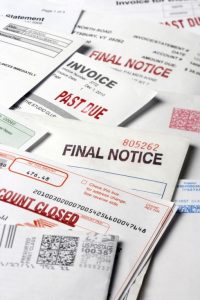
The following is a guest post by Debt.org, America’s Debt Help Organization. If you are interested in submitting a guest post for A Disease Called Debt, please contact me for more information.
Happily ever after isn’t the same when you live on a mountain of debt. If you’re like many couples, you and your spouse have found yourselves in debt, either before or after your wedding day. You are finally ready to pay some of your worries away, but are unsure of where to start.
You might be thinking the first bit of debt to tackle would be the one with the largest amount due, but this isn’t always true.
Here are some tips on what debt you should pay off first:
Installment Debt Versus Revolving Debt
- Installment debt is usually a one-time loan where you know in advance the fixed monthly rate and know exactly how much you will have to pay monthly. This type of debt usually requires a higher monthly payment and a lower interest rate. Examples of installment debt include student loans, car loans, home equity loans and mortgages.
- Revolving debt is a type of loan where you have a credit limit and you can borrow and payback as many times as you need to finance different purchases. This type of debt usually requires a lower monthly payment, but a higher interest rate. Examples of revolving debt include credit cards, credit lines such as home equity lines of credit.
Which Kind of Debt Should You Pay Back First?
When paying back debt, one of the most important things to consider is which debt will reflect better on your credit rating, which, as you know, can affect almost any future purchase. Although installment debt is important to pay on time, it shouldn’t be your priority when choosing what debt to completely pay off first. However, it is important to keep up with the minimum payments, if possible.
By paying the minimum payment on your student loan, you’re keeping the government happy, while protecting your credit rating. Installment debt should also be lower on your priority list, because there are tax deductions available for this type of debt, such as deductible interest. This means most of your interest can be offset by a tax deduction.
Generally, revolving debt has a more significant impact on your credit rating, and it should usually be paid back first. Here’s why:
Because revolving debt requires a lower monthly payment and is usually coupled with a higher interest rate, this is where a lot of people run into trouble. If you pay your credit card debt first, it will reduce the overall amount you owe as a consumer and the overall percentage used, which creates more available credit.
If you have multiple credit card debts, consider paying off the one with the highest interest amount. If you can, pay more than the monthly minimum, while continuing to make the minimum payments on the rest.
Although all debt is important to manage, don’t let it control your life. Get back on track to marital bliss and start paying off any outstanding revolving debt first, and then work to pay off any installment debt, but ultimately, you must do what works best for you. This will help minimize your overall debt and contribute to a happier and healthier marriage.
Kaitlyn Fusco is a content writer for Debt.org. She combines her interests in writing and overcoming debt to inform the public about issues related to credit, debt and personal finance. Feel free to follow their conversation on debt.org twitter
Related posts:
* Photo supplied by Debt.org
3 Comments
Very good post! It is very important to categorize your debts and know which one to pay off first. As mentioned you also need to take care of your credit score so that it improves over the period of time
Rita P recently posted…Alexa is happy, Google is happier – Secret to create wonders for your blog
That is a very good point. Keep in mind, if you have have any revolving debt, it should be your first priority to pay off.
Vincent Ramos recently posted…Borrowers Face Confusion over New Student Loan Servicers